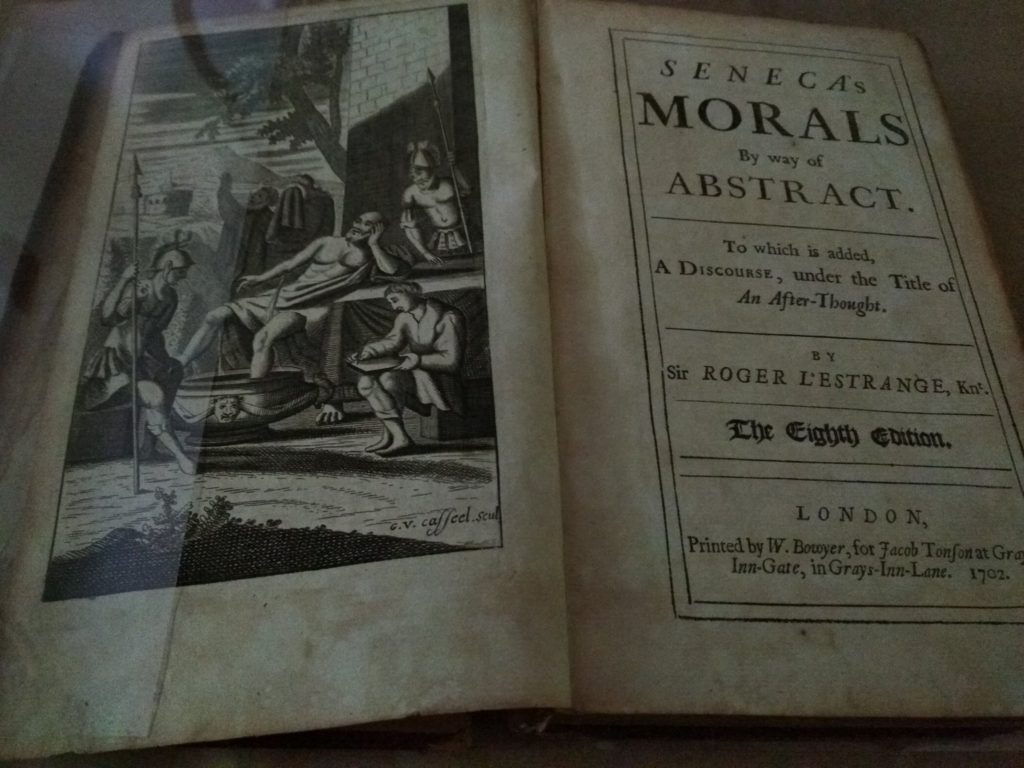This past weekend, I acquired a copy of Seneca’s Morals By Way Of Abstract, published in 1702. My attention was drawn not only by the book’s age– it’s more than three hundred years old– but also by this note in the translator’s preface:
We are faln into an Age of vain Philosophy; (as the Holy Apostle calls it) and so desperately over-run with Drolls and Scepticks, that there is hardly any thing so Certain, or so Sacred, that is not exposed to Question, or Contempt. Insomuch, that betwixt the Hypocrite, and the Atheist, the very Foundations of Religion, and good Manners are shaken, and the Two Tables of the Decalogue dash’d to pieces, the one against the other: The Laws of Government are Subjected to the Phansies of the Vulgar; Publick Authority to the Private Passions and Opinions of the People; and the Supernatural Motions of Grace confounded with the Common Dictates of Nature. In this State of Corruption, who so fit as a good honest Christian-Pagan, for a Moderator betwixt Pagan-Christians?
The translator, Sir Roger L’Estrange, published this when he was 86 years old. So you could perhaps read this translator’s preface as a 16th century example of a Baby Boomer complaining about how the Millennials are ruining everything.

Frontspiece of Seneca’s Morals, with engraving of Seneca committing suicide at the command of emperor Nero.
L’Estrange did not intend this an ordinary summary-translation of Seneca for a general interest. He published it because he was angry. He was 26 years old when the English civil war began; he was decidedly of the King’s party, and published pamphlets against the Parliamentarians; he spent nearly the whole of his life thereafter advocating for Protestant and royalist causes. I think L’Estrange was one of those “father knows best” conservatives, and was utterly incapable of imagining that there might be anything wrong with his worldview. You can see in the passage above how he refers to Catholics as ‘pagans’. Here’s another passage from that preface which shows this attitude:
Have we not seen, even in our dayes, a most Pious (and almost a Faultless) Prince, brought to the Scaffold by his own Subjects? The most Glorious Constitution upon the Face of the Earth, both Ecclesiastical and Civil, torn to Pieces, and dissolv’d? The Happyest People under the Sun Enslav’d; Our Temples Sacrilegiously profan’d; and a Licence given to all sorts of Heresie, and Outrage? And by whom, but by a Race of Hypocrites, who had nothing in their Mouths all this while, but The Purity of the Gospel; The Honour of the King; and, The Liberty of the People: assisted underhand with Defamatory Papers, which were levell’d at the King Himself, thorough the sides of His most faithful Ministers? This PROJECT succeeded so well against One Government, that it is now again set a foot against Another; and by some of the very Actors too in that TRAGEDY, and after a most Gracious Pardon also, when Providence had laid their Necks, and their Fortunes at His Majesties Feet. It is a wonderful thing, that Libells, and Libellers, the most infamous of Practises, and of Men; the most Unmanly, Sneaking Methods, and Instruments of Mischief: the very Bane of Humane Society, and the Plague of all Governments: It is a wonderful thing (I say) that these Engines, and Engineers, should ever find Credit enough in the World to engage a Party: But it would still be more wonderful, if the same Trick, should pass twice upon the same People, in the same Age, and from the very same IMPOSTORS. This Contemplation has carry’d me a little out of my way, but it has at length brought me to my Text again…
I think that in that passage, he is reflecting on his life. He lived through the English Civil War, and the Restoration; he spent a year in exile due to political opposition (did he flee for his life, or did he walk off in disgust?). Although he was knighted by King James II, he was indited in plots against the successor, King William of Orange, and even spent time in jail for it. He was frustrated for all his life by people whose way of thinking was different than his. And he did everything he could to fight them.
So I think that in publishing this little book, L’Estrange was hoping to induce in his contemporaries a kind of philosophical and moral enlightenment. He wanted it to be a corrective force against the “fancies of the vulgar” noted above, and perhaps produce a reconciliation between the different philosophical factions in his society. That’s what I think is implied in this comment, to the effect that he thought Seneca’s text is the greatest gift anyone ever gave to the human race:
I am sorry it is no better, both for your sakes and my own: for, if it were written up to the Spirit of the Original, it would be one of the most valuable Presents that ever any private Man bestow’d upon the Publick: And this too, even in the Judgment of both Parties, as well Christian as Heathen: of which in its due place…
Next to the Gospel it self, I do look upon it [Seneca’s work] as the most Sovereign Remedy against the Miseries of Humane Nature; and I have ever found it so in all the Injuries and Di∣stresses, of an Unfortunate Life.
So there you have it. Even in 1702, old men were still telling the kids to “shut up and respekt mah authoritay!”
I share none of L’Estrange’s political views, of course, except perhaps an appreciation of Stoicism and a mild curiosity about the monarchy. Nonetheless, I’m finding it interesting and even somewhat spiritual to hold this small piece of intellectual history in my hands, and to see how it is not much different from the kind of angry public argumentation that still take place today.
